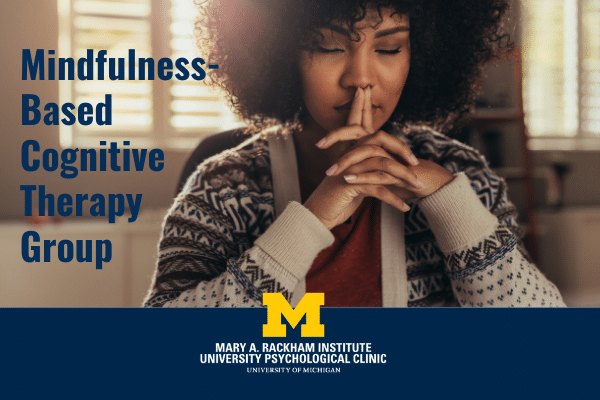The University Psychological Clinic is offering a fall session of the Mindfulness-Based Cognitive Therapy (MBCT) group, beginning Oct. 12, 2020.
Clinician Nicole LaBrie, LMSW, will lead an eight-week MBCT group starting 6:30 p.m. Monday, Oct. 12. The MBCT group serves as treatment for people with depression as well as other mental health conditions. While the chemical and physical aspects of depression and other mental health disorders are far more complex than just feeling down, current research supports a cognitive approach as a way to change patterns of brain functioning and build resilience in people struggling with chronic depression.
Fall MBCT Group Details
- What: MBCT group that will run for eight weeks.
- When: 6:30-8 p.m. Mondays, Oct. 12 – Nov. 30, 2020.
- Where: Online via secure hosted Zoom sessions.
- Cost: Varies, some insurances cover the cost. Contact us to find out more.
- Next Steps: This session may be full, however, we run groups throughout the year. Contact us to learn more about getting started with this group or to be added to a waitlist for the next MBCT group session. Call (734) 615-7853 to get started.
Would you like to refer a client to the MBCT Group?
Professional referrals are always welcome – visit Make a Referral to submit a secure, online referral for this or other MARI services or to find out other ways to submit a client referral.
What MBCT Group Participants can Expect
This program uses a combination of cognitive therapy and mindfulness to help participants form new, healthier modes of thought. MBCT initiates a cognitive change that helps clients move past events that have the potential to trigger relapse. Participants learn how to view their thoughts without judgment.
MBCT is about equipping participants with the ability to regulate one’s own thoughts and moods and to put new skills into practice in the way they are most useful to each client. MBCT helps flip the script in a way, empowering participants, helping them step into a well-fortified position and giving them the tools and the knowledge to help themselves at any stage of life.
When participants bring a sense of curiosity, a willingness to be flexible, and a commitment to themselves — they are rewarded with skills like:
- The ability to recognize shifts in mood
- The ability to tolerate difficult thoughts and feelings
- The ability to balance out difficult thoughts and feelings
- The understanding that thoughts are not facts
- A personal meditation practice
The skills each participant learns are meant to translate into making daily life more manageable. For example, one participant in the program was able to take their breathing skills to work in a crowded lab. If they became overwhelmed or stressed, a simple breathing exercise allowed them to come back to the task at hand with a renewed mindset — instead of spiraling into negative thought and leaving work for the day.
The Client’s Commitment
MBCT group is a serious commitment, in both time and discipline. Participants will meet for group therapy once a week for 1.5 hours. Attendance at each weekly session is very important and homework needs to be completed every day. Participation, while not forced, is an important element in participants’ personal growth.
About the U-M Psychological Clinic at the Mary A. Rackham Institute (MARI)
The University Psychological Clinic provides psycho-educational evaluations and evidence-based psychotherapy to students, staff, and faculty at the University of Michigan as well as members of the local community and southeast Michigan. That translates to compassionate, confidential services such as one-on-one therapy, group therapy, couples counseling, testing for things like ADHD, and more. Our professional services and our professional training program are accredited by the American Psychological Association (APA) and the Council on Accreditation (COA).

